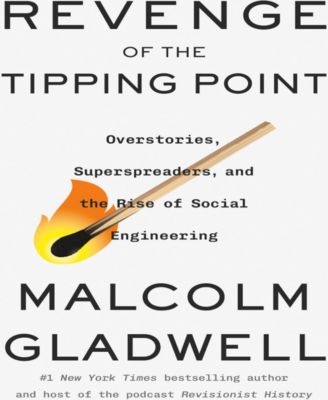Revenge of the Tipping Point: Overstories, Superspreaders, and the Rise of Social Engineering by Malcolm Gladwell
Product details
Web ID: 20312107A Nuanced Look at How the World Really Works
While his original book focused on the positive side of social change, this new title, Revenge of the Tipping Point, is an absolutely fascinating re-examination of how those same forces can be wielded for negative or dangerous outcomes. Gladwell, with his signature blend of storytelling and social science, delves into everything from the opioid crisis to forgotten TV shows, showing how seemingly small things can have devastating consequences. It's the perfect book for anyone who loves to have their assumptions challenged and wants a more nuanced understanding of how our world really works.
Recommends this product
Customer review from barnesandnoble.com
Interesting Concepts
I was expecting this book to be amazing based on the reviews/ratings. It certainly was a good book, and it wan engaging. But I did not think it was as good as the tipping point.
Recommends this product
Customer review from barnesandnoble.com
Better than the first one!
I had listened to quite a few interviews/podcasts featuring Gladwell about this book and was a little concerned that I had already heard too much and that I might not enjoy this as much. However, those tidbits did a masterful job at whetting my appetite for this book! I love how the stories are all interwoven and how he sticks to several of his stylistic elements of storytelling from his previous books (bringing statistics to life, sharing obscure research that he highlights in intriguing ways). There is so much in here that is interesting and that I will bring up in conversations with family, friends and my students as well. It is a quick read and you likely won't be able to put it down!!
Recommends this product
Customer review from barnesandnoble.com
A 5-Star Review for "Revenge of the Tipping Point
Malcolm Gladwell's "Revenge of the Tipping Point" is a brilliant and thought-provoking exploration of the dark side of social epidemics. Building on the foundation laid by his earlier work, "The Tipping Point," Gladwell masterfully examines how the very forces that can drive positive change can also be manipulated and exploited, leading to unintended and often devastating consequences. One of the book's greatest strengths is its ability to weave together seemingly disparate stories and ideas into a compelling and cohesive narrative. Gladwell takes us on a journey from the streets of Los Angeles, where a teenage bank robbery epidemic raged, to the halls of Harvard University, where the admissions process favors athletes over academics, to the world of prescription painkillers, where the aggressive marketing of OxyContin fueled a national crisis. Through these captivating examples, Gladwell introduces us to several key concepts that are essential for understanding the dynamics of social epidemics: Overstories: These are the overarching narratives that shape our beliefs and behaviors. Gladwell shows how overstories can emerge from a variety of sources, including historical events, cultural trends, and even bureaucratic policies. The impact of overstories is illustrated by the example of "triplicate laws," which required doctors in certain states to make multiple copies of opioid prescriptions. These laws, initially intended as a simple bureaucratic measure, created a lasting narrative around the dangers of opioids, ultimately influencing prescribing practices and addiction rates for decades. Superspreaders: These are the individuals or groups who disproportionately influence the course of an epidemic. In the context of disease outbreaks, superspreaders possess biological characteristics that make them exceptionally contagious. However, Gladwell extends this concept to other domains, arguing that certain individuals can act as superspreaders of ideas, behaviors, and even social problems. In the case of the opioid crisis, a small group of doctors, dubbed the "Super Core," were responsible for prescribing a vast majority of OxyContin, effectively fueling the epidemic. Group Proportions: This concept highlights how group dynamics change significantly when a minority group reaches a certain critical mass. Gladwell explores this idea in the context of racial integration, corporate leadership, and even social movements, demonstrating how shifts in group proportions can trigger dramatic and often unexpected changes in behavior and outcomes. Gladwell's writing is engaging, accessible, and often humorous, making complex ideas easy to grasp. He masterfully interweaves scientific research, historical anecdotes, and personal stories to create a narrative that is both informative and entertaining. "Revenge of the Tipping Point" is not simply a rehash of Gladwell's previous work; it's a significant evolution of his thinking. The book challenges us to think critically about the forces that shape our world and to recognize the potential for both positive and negative tipping points. Gladwell urges us to be more aware of the overstories that influence our beliefs and to consider the unintended consequences of our actions. This book is a must-read for anyone interested in understanding the hidden forces that drive social change. It's a timely and important work that will leave you questioning your assumptions and pondering the future of our increasingly interconnected world. The full Deep Dive review of this book can be watched from our YouTube channel... https://youtu.be/IHFf2WZ8toc
Recommends this product
Customer review from barnesandnoble.com
An Important Read
Twenty five years after The Tipping Point, Gladwell revisits the lessons from that book with a new lens. As always, it is a great mix of storytelling and social science in a totally enjoyable writing style. With this we get a guide to make sense of our modern world.
Recommends this product
Customer review from barnesandnoble.com
a welcome revisit
Engaging as always, this revisit to his earlier book brings fresh insights.
Recommends this product
Customer review from barnesandnoble.com
Gladwell is Back
Malcolm Gladwell is back with his brand of accessible, engaging and thought-provoking approach to a wide variety of topics. Revenge of the Tipping Point is a thought exercise about how ideas, social movements, and epidemics spread or do not spread based on whether they can meet certain criteria or a threshold - aka the Tipping Point. You'll learn something here, even if you don't always agree with his conclusions.
Recommends this product
Customer review from barnesandnoble.com


